On Sundays, Daniela joins thousands of other domestic workers on the streets of Hong Kong. It is their one day off from the all-consuming task of caring for the families that employ them across the city. Lining the sidewalks of the financial and shopping hub, Central, are makeshift picnic blankets. Some helpers lounge in fully shaded tents, or sing karaoke on the cardboard boxes just outside them. Others go shopping — not at the rows of designer brands surrounding each MTR station, but at the small array of stalls set-up in front of them, featuring clothes, beauty products and food.
Daniela, who chose not to use her real name because of security concerns, came to Hong Kong from the Philippines seven years ago, in 2018. She has worked with one family since arriving, in a role that covers all things domestic: cooking, cleaning, laundry, even party planning. But on her day off, Daniela has another venture.
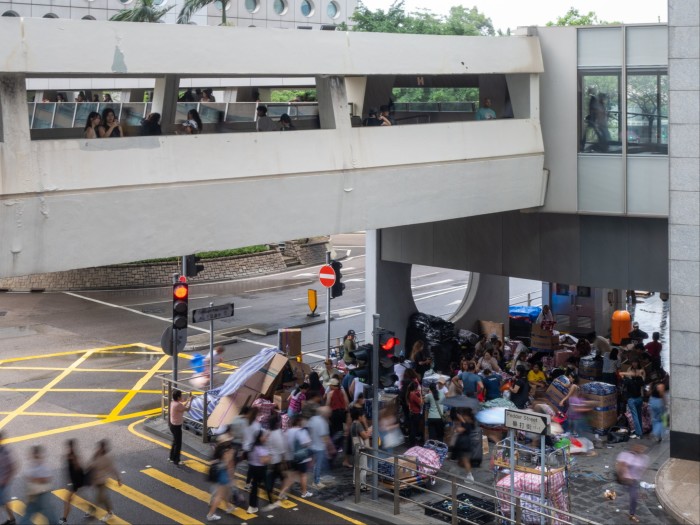
“For me, selling clothing was a financial opportunity,” she says. She started three years ago, when a friend approached her with a pile of her employer’s clothes destined for donation. Daniela saw a new way of making money.
“Of course domestic helpers can just buy clothes like everyone else,” she continues. “But second-hand [clothes] from employers’ donations are more sturdy and more branded. We’re just domestic helpers, but we have to find ways to be trendy as well.”
Branded items are a huge driver at these Sunday markets, where migrant workers, who often balance minimum-wage salaries with familial responsibilities back home, hope to purchase quality goods at discounted prices. On the stalls they can find second-hand Nike sneakers and even the occasional luxury bag.
For the domestic workers who come to shop, wearing branded clothing is a way to elevate their status in a city that often looks through them. For sellers like Daniela, the market boosts their income. Although supply can be inconsistent, Daniela says she earned HK$500 ($64) for one bundle of clothing, around one-tenth of minimum monthly earnings. “A lot of helpers here are 60 or 65 and still working for the minimum wage,” she explains. “Our families back home have more needs over time, especially with children going to college. That’s why so many helpers sell on the side, to have that extra.”
According to Manisha Wijesinghe, executive director of HELP for Domestic Workers, a non-profit in Hong Kong supporting migrant domestic workers and their employers, the minimum wage for migrant domestic workers in Hong Kong is HK$4,990 ($641) per month.
“While this may seem adequate when converted into the local currencies of workers’ home countries, the reality is far more complex,” says Wijesinghe. “A significant number of migrant domestic workers incur heavy recruitment debts due to excessive and often illegal fees charged by recruitment agencies.”
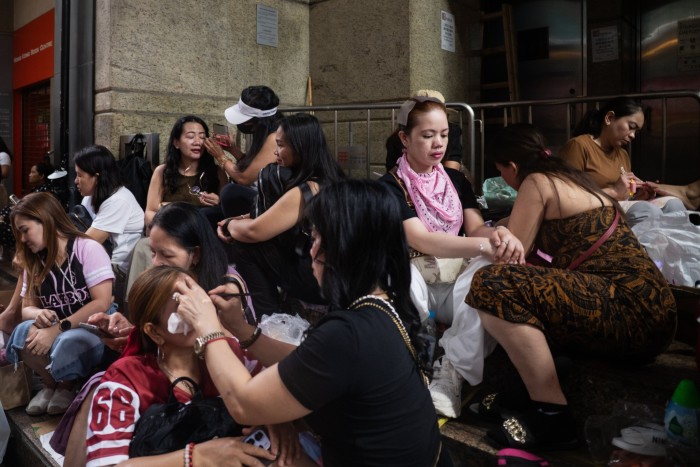
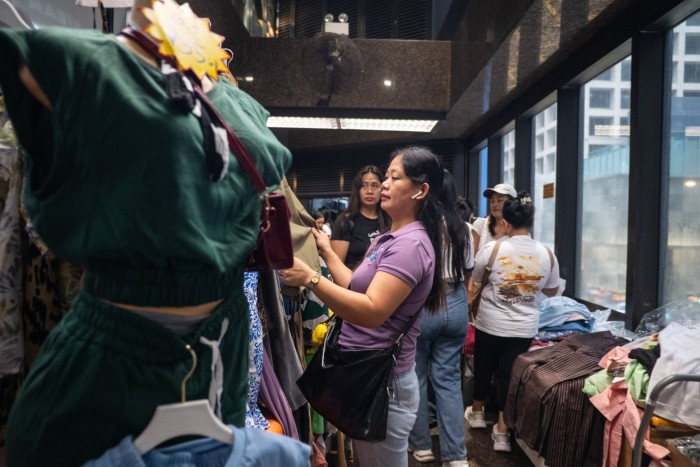
After her first bundle sold three years ago, word of mouth became the main source for new hauls for Daniela, all valued around the same amount. “It was easy,” she says. Hawking, however, is not.
In Hong Kong, domestic workers are prohibited from engaging in profit-generating activity outside of their employment contract. At HELP for Domestic Workers, for example, around 11 per cent of immigration inquiries relate to migrant domestic workers facing criminal charges for illegal employment, of which hawking is a part. The risk of being caught, and jeopardising both job contracts and Hong Kong visas, is significant.
Daniela herself ran from the police once. She was selling shoes and clothes out of a suitcase outside an MTR station when officers approached. “I just left my things there and ran. It was scary,” she says. “We know that it is illegal and we shouldn’t be doing it. But some of us don’t have any choice.”
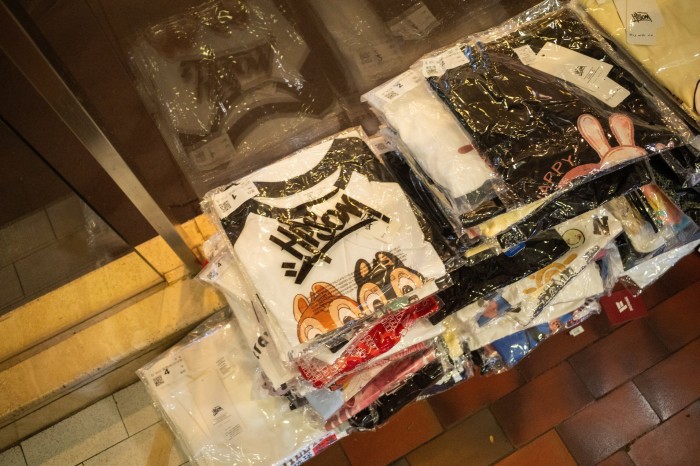
There are no official estimates for the size of the Sunday markets, but based on her own observations, Daniela believes that one in 10 domestic helpers in Hong Kong have participated in garment reselling, either in-person or online through digital platforms like Facebook Marketplace. From the physical presence alone, concentrated primarily in Hong Kong’s Central neighbourhood and other MTR entrances, the volume of business could exceed HK$15,000 ($1,928) on just one crowded block every Sunday, if every seller matched the return of Daniela’s bundles. (None of the government departments contacted, including the Immigration Department, Department of Labour, or the Hong Kong Police Force reported tracking hawking activities.)
Despite the fact that transactions do take place very publicly every Sunday, these markets remain insular: ultimately, they are cyclical exchanges by domestic workers, for domestic workers. Their existence as a parallel economy to Hong Kong’s mainstream one is consistent with a citywide sentiment. Domestic workers in Hong Kong represent a paradox: integrated wholly into the city by virtue of their jobs, which require living with local families, yet largely estranged from broader Hong Kong society, socially and economically.
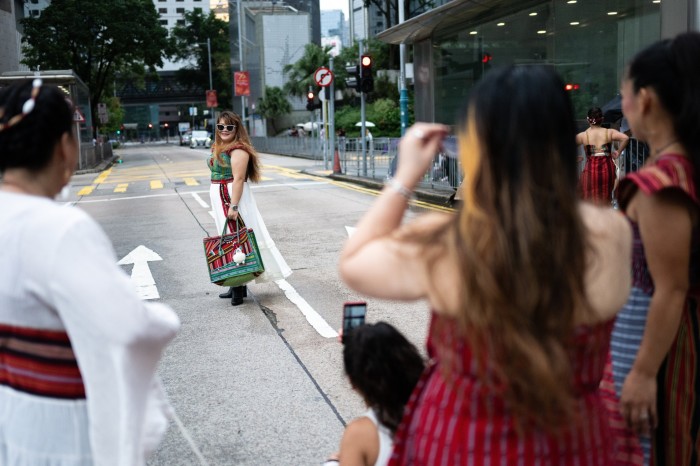
Amid a city that reflects little on the experience of domestic workers outside of their working hours, the market is a space they have carved out for themselves, with fashion purchases a means of expressing who they are and aspire to be.
“Many migrant domestic workers come to Hong Kong with the goal of providing for their families and loved ones back home,” says Myles Ng, founder and chief executive of HelpBridge, a business school for overseas Filipino workers based in the city. “But after these workers spend a considerable amount of time living and working abroad, I think it’s natural for them to reconsider their goals and plan for the future. By running entrepreneurial ‘side hustles’, they open themselves up to new possibilities.”
Hawking can just be a stepping stone. “Now, I make cakes,” says Daniela. “It’s my dream to move back to the Philippines, and open a bakery.”
Follow uson Instagram and sign up for Fashion Matters, your weekly newsletter about the fashion industry


